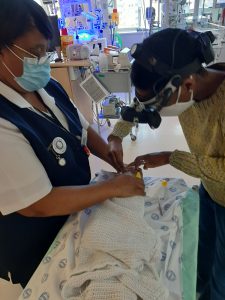Join a powerful, unprecedented alliance for better eye health for all.
Join IAPB-
Choose an alternate language here
There is an epidemic of blind babies in Sub-Saharan Africa from retinopathy of prematurity (ROP) due to increasing survival of premature neonates. This stems from improving neonatal care in much of sub-Saharan Africa. The Stop Infant Blindness in Africa (SIBA) initiative, co-chaired by Drs. Sherwin Isenberg of UCLA, Scott Lambert of Stanford University, Dupe Popoola of University of Ilorin Teaching Hospital, Nigeria, and Martha Mkony of Muhimbili University of Health Science, Tanzania was formed under the mandate, “We must act now to stop it.”

ROP is an eye disorder caused by abnormal development of retinal blood vessels in premature infants. Due to their immature lungs, premature babies are often given supplemental oxygen, but if this oxygen is not carefully regulated, ROP can worsen and lead to blindness. The impact of childhood blindness is also an issue of child mortality. Experts estimate that roughly half of children in low-income countries who go blind will die within a few years of diagnosis, so the imperative to stop blindness from ROP is critical.
Sub-Saharan Africa has a 12% pre-term birth rate making it the second highest rate by region in the world, and in 2014, it was estimated there were 4.2 million pre-term births in the region accounting for 28% of the total pre-term births globally.
To address the eminent threat of blind babies in sub-Saharan Africa, SIBA has published three studies to define the ROP problem in the region. Notably, it has developed three Centers of Focus in Nigeria (University of Port Harcourt Teaching Hospital), Uganda (St. Francis Hospital – Nsambya, Kampala), and Rwanda (King Faisal Hospital, Kigali) to provide neonatologists/pediatricians and ophthalmologists with the tools and training they need for preventing, screening, and treating ROP. The Centers are being supplied with oxygen blenders, oxygen sensors, lasers and other equipment to combat ROP. These sites will become centers for education where neonatal providers from throughout sub-Saharan Africa will learn proper oxygen management for premature infants and screening/treatment for ROP. In addition, SIBA has developed an extensive online video library in English, French, Portuguese, and Arabic to educate African ophthalmologists and neonatologists about ROP.
The International Pediatric Ophthalmology & Strabismus Council created the SIBA initiative in partnership with the Children’s Eye Foundation of the American Association for Pediatric Ophthalmology and Strabismus. Learn more at: www.sibaimpact.org.